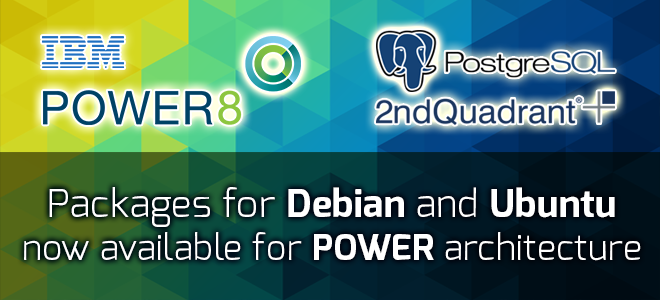
Now Available! Debian and Ubuntu packages for Power Architecture.
The official announcement was published last Friday, September 30, 2016: the PostgreSQL repository for Debian and Ubuntu packages, apt.postgresql.org, has been extended by adding binary packages of IBM’s Little Endian POWER8 architecture.
Fantastic, isn’t it?
What few know is how we achieved this success.
The primary ingredient: human relations.
Everything began in October 2014, during the Open Source conference organized by Soiel in Milan. IBM Italy was a sponsor of the conference, as were we, and our desks were very close.
The talks presented by both companies initiated the first interactions, and opened a dialogue with mutual respect.
The initial conversation was based on a common understanding of an IT market that is constantly evolving; increasingly geared towards open source, and where the growing demands of companies are based on reliability and support, both in terms of technology and platforms.
As most people know, IBM has designed an architecture based on open technology that provides performance and security: IBM Power Systems. This platform is dedicated to Open Source technologies, and, is therefore, an interesting opportunity for PostgreSQL.
So: Why not allow PostgreSQL to maximize the performance, speed, and power that a platform such as Power8 provides?
Initially the intent was to carry out performance tests against both the 9.4 release and the 9.5 release of PostgreSQL. It was in April 2015 that there was an opportunity for us to interact with the technicians present in Montpellier in the IBM Power Systems Linux Center.
The benchmarking results were presented at the 2015 edition of the “5432 … MeetUs!” conference by one of the Montpellier technicians, with whom we had only interacted with remotely at this point. That is what made this a key encounter, during which we came up with the idea of enhancing the PostgreSQL repository with Debian and Ubuntu packages for Power.
To make this feasible, extensive planning and analysis was required and it was known that it would not bring forth immediate results.
It was during the 2016 edition of the annual “5432 … MeetUs!” conference organized by 2ndQuadrant that the solid foundation for the development of the packages was laid, which is now available for all.
The presence of not only IBM Italy, but also the technicians from the IBM Power Systems Linux Center of Montpellier, finished off the project. Marco Nenciarini, Debian developer and maintainer of the packages distributed by the Community of PostgreSQL, states: “It was a pleasure for me to work on this architecture, designed for loads that require high concurrency and large data processing bandwidth and to work with Sébastien Chabrolles from the IBM Power Systems Linux Center – Montpellier. It was a fantastic experience that has enriched us both. ”
Thanks must also be given to credativ, namely Christoph Berg, who in recent weeks, has partnered with us to setup the new architecture in the PostgreSQL Community infrastructure for building, testing, and distribution of the Debian and Ubuntu packages for Power Architecture.
To close, a special thanks to IBM Italy, important in the accomplishment of this project, for the opportunity to meet and work with such great people. All of us at 2ndQuadrant are confident that this collaboration will lead to the growth of other fantastic things for PostgreSQL in enterprises.
We can not wait to conceive new projects with IBM Italy and IBM Power Systems Linux Center – Montpellier.
A presto!
